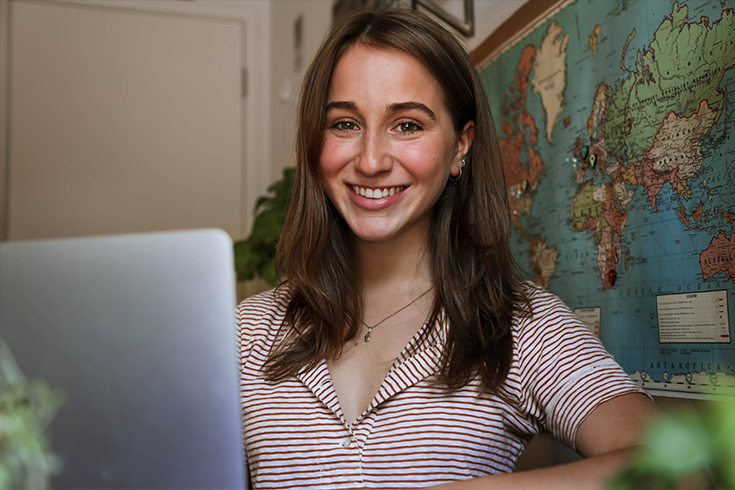Samantha Pulgini - Madagascar (virtually) & California
Samantha Pulgini
Madagascar Lemurs & California Meadows: A Remote Approach to Addressing One Health Issues in Multi-use Ecosystems Samantha Pulgini — UCD SVM Class of 2023
Prior to COVID-19, my plan for the summer of 2020 had been to complete a lemur conservation project based in Ambodiforaha—a remote village situated on the coast of Northeast Madagascar. Despite being known for its distinctly rich flora and fauna, this island country is facing a pressing dual crisis in biodiversity and public health, the consequences of which threatens endemic wildlife species such as the lemur. With the support of mentors Kathy West, Dr. Lisa Tell, and Dr. Cortni Borgerson, the proposed summer project aimed to utilize research, youth-outreach, and photography in order to address the issues of lemur extinction, environmental degradation, and associated implications on human health evident throughout Madagascar.
As the state of the pandemic worsened throughout the spring, my mentors and I made the decision to develop and eventually pursue an alternative project inspired by the work we had originally hoped to accomplish in Madagascar. Acknowledging the benefits of a remote approach, we viewed these unique circumstances as an opportunity to engage with individuals globally on lemur-related One Health issues, rather than targeting Malagasy communities alone.
Centered around the development of a youth-oriented online curriculum, the aim of this ongoing project is to educate students around the world on lemur history and biology, conservation issues and solutions, and human impacts on the environment. While meeting in person was not an option, my mentors and I worked together remotely during the months of June and July in order execute this project, frequently touching base over Zoom to exchange ideas. During this time, I was given the creative freedom to lead the website design and lesson development aspects of the project through completing the following tasks: merging personal research with previously developed resources in order to construct lesson material, designing visual elements of the curriculum, and transforming the completed work into an engaging online format. Although it may have been completed from the comfort of my home, this project served as a worthwhile and immersive summer experience, allowing me to acquire technical skills in website building, explore approaches to effective teaching, as well as further educate myself on the intersection of biodiversity loss and public health in Madagascar.
While lemurs may be endemic to Madagascar, issues surrounding conservation and human health can be found all around the world, including California. Recognizing this opportunity, I sought out an additional summer project centered around the multidisciplinary research and restoration efforts being implemented at Clover Valley Ranch in the Northern Sierra Nevada. Historically inhabited by the Mountain Maidu, the high elevation meadows of Clover Valley have faced significant degradation through practices of overgrazing and poor land management over the last century. The landscape of the valley has been drastically altered as a result of this overuse, impacting the wildlife populations inhabiting the ecosystem as well as the water system that runs through the land, which serves as a major headwaters for the state of California.
Through the mentorship of Dr. Woutrina Smith, Dr. Brian Bird, and Dr. Ariel Loredo, I spent the summer being immersed in the variety of field methods being employed throughout this diverse, multi-use ecosystem, which range from wildlife camera trapping and landscape analysis, to water sampling, fish surveying, rodent trapping, and vegetation monitoring through transects. While a portion of the project was completed remotely, my exposure to and engagement in the described field methods occurred throughout a series of trips I was able to make out to the research site during the months of June and July. COVID-19 precautions limited the degree to which I could be directly involved in these tasks, however I was still able to observe the work being done and provide assistance from the periphery when needed. Beyond these contributions, I also devoted time to documenting landscape changes and evidence of healing throughout the meadow, utilizing photography to tell the story of Clover Valley Ranch. Finally, I concluded the summer project remotely by writing an interactive case study for the UC Davis Global Health Institute’s Planetary Health Center of Expertise.
Highlighting real-life interventions being utilized throughout Clover Valley, this case exercise challenges readers to identify One Health strategies for restoring degraded wet meadow ecosystems while balancing the needs of stakeholders, wildlife species, and the environment in the process.
Although it may not have been exactly what I had planned, this summer served as an incredibly valuable learning experience and prompted growth in ways I could not have predicted. Beyond expanding my knowledge on critically important conservation issues, my experiences this summer granted me with the opportunity to explore the intersection of my creative and veterinary interests, investigate unfamiliar topics, and collaborate with experts specializing in various areas of study, all of which has sparked tremendous personal as well as professional growth. The role of veterinarians extends far beyond the limit of animals alone, and this summer has reaffirmed my ambition to develop a One Health- inspired career that is built around this very sentiment.



